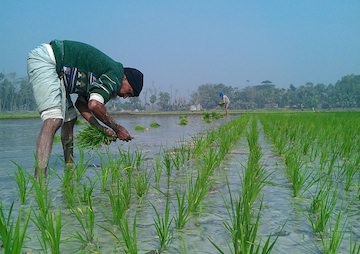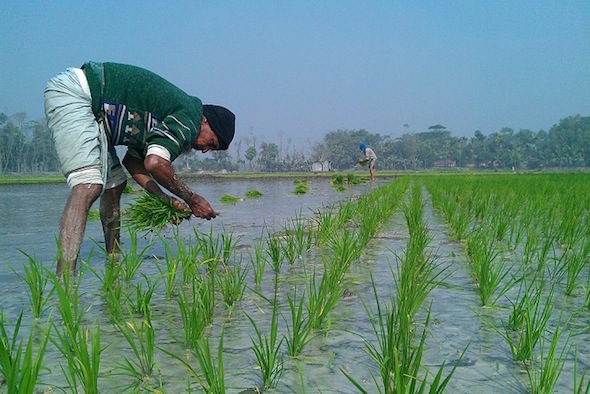Aid Is Aimed at Rice Farmers in a Warming World
International team provides help to small-scale farmers on the eastern Ganges plains who are struggling to make a living and grow enough rice to feed the population.
By Bhrikuti Rai, Climate News Network

Climate change is increasing the hardships faced by rice farmers on the eastern plains of the Ganges. J N Sarkar via Wikimedia Commons
This Creative Commons-licensed piece first appeared at Climate News Network.
KATHMANDU — Research scientists are coming to the aid of 300 million people along the River Ganges for whom rice is the staple food and who face a hungry future because productivity is poor and the harvest is threatened by climate change.
The team of scientists and development practitioners from Australia, Bangladesh, India and Nepal plan to improve the productivity, profitability and sustainability of 7,000 small-scale farmers in the eastern Gangetic plains with a five-year US$ 6.7 million programme.
According to Nepal’s Ministry for Agriculture Development, 66 per cent of Nepal’s total population of almost 27 million is involved in agriculture and contributes 39 per cent in the GDP. Local scientists say that lack of access to climate-resilient technologies and dependency on monsoon rains for irrigation are major problems for farmers in Nepal.
Food security
“Nepal is one of the most vulnerable countries to projected climate change effect, so the project will help small-scale farmers address pressing issues about their livelihood and food security,” Devendra Gauchan, senior scientist at Nepal Agricultural Research Council, told the Climate News Network.
Altogether, the eastern Gangetic plains of Nepal, Bangladesh and India are home to 300 million people. The aid team, funded by the Australian government, aim to help rice farmers systems through efficient use of water and conserving resources to improve adaptation to climate change, and also connect them to new markets.
The Australian Centre for International Agricultural Research (ACIAR) will manage the programme, which will be led by the International Wheat and Maize Improvement Centre in eight districts — two in north-west Bangladesh, two in east Nepal, and two each in the Indian states of Bihar and West Bengal.
“Nepal is one of the most vulnerable countries to projected climate change effect”
“Rice-based system productivity [in the eastern Gangetic plains] remains low, and diversification is limited because of poorly-developed markets, sparse agricultural knowledge and service networks, and inadequate development of available water resources,” says Kuhu Chatterjee, South Asia regional manager of ACIAR.
The project was designed in consultation and participation with NARC, the Bangladesh Agricultural Research Council, the Indian Council of Agricultural Research, and agricultural universities in India.
New technologies
Local scientists feel that this project will also help build capacity of researchers in Nepal. Devendra Gauchan said: “Agricultural research in Nepal has very limited strength in terms of human resource, infrastructure facility and institutional capacity. Through this project we will get to learn about new technologies and research management from scientists from participating countries.”
According to Kuhu Chatterjee, the project will test and fine-tune the technologies developed in countries such as Australia, Canada and Brazil, and will modify them to suit farmers in the eastern Gangetic plains.
“Community consultations will be conducted to identify different ways to optimise the productive use of rain and irrigation water, increase cropping intensity through timely planting, reduced tillage and enhancing access to, and use of, energy-efficient irrigation technologies,” Chatterjee said.
Your support is crucial...As we navigate an uncertain 2025, with a new administration questioning press freedoms, the risks are clear: our ability to report freely is under threat.
Your tax-deductible donation enables us to dig deeper, delivering fearless investigative reporting and analysis that exposes the reality beneath the headlines — without compromise.
Now is the time to take action. Stand with our courageous journalists. Donate today to protect a free press, uphold democracy and uncover the stories that need to be told.






You need to be a supporter to comment.
There are currently no responses to this article.
Be the first to respond.